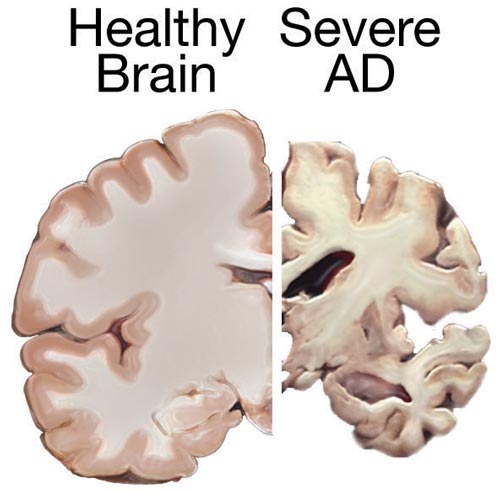Meditation Results in Brain Growth

How Does the Brain Grow
The Yoga practice of concentration, of steadying the mind by fixing the thought, makes the brain cells grow, and thus creates an instrument adaptable for higher thinking in the future. – Annie Besant
This was written in the early 1900s by Annie Besant in her book Modern Science and the Higher Self. Science today is able to prove her right with all the studies conducted on how meditation can help in brain growth. Spiritual and religious traditions have always emphasized the practice of concentration and meditation to attain spiritual progress and become perfect human beings. What does it mean to us in today's world? How or why should we pay attention to the growth of the brain? Studies are proving that meditation results in brain growth, but to do meditation properly requires a healthy body and brain. The brain is the most complex, powerful organism in the universe and taking care of it requires a holistic approach.
The most important points to remember are:
- The brain has an unparalleled capacity for restoring its own function.
- This is because the brain does not store each of its memories in single, separate brain cells, or neurons. Instead memories exist in networks of connected neurons. If one neuron dies, the brain can switch its memory connection through another neuron, and retain the memory. Neurologists call this redundant circuitry.
- Brain Plasticity – is the ability of the brain to find new thought 'pathways', called dendrites, when old pathways are destroyed.
- Brain cells can grow new dendritic branches at any age. One easiest and effective way to create new connections is simply to think. Especially concentration on one particular subject at a time will help in growing the respective part of the brain.
Change your Mind, Change your Brain: The Inner Conditions for Authentic Happiness by Matthieu Ricard

Brain Deterioration and Alzheimer's Disease
We all take it for granted that our brain deteriorates as we age. However, when we look around not all old people go senile or get Alzheimer's disease. What are they doing which prevents them from suffering from such age related problems? Here are some facts to ponder on:
- The brain is just flesh and blood and will respond to care just as the other organs in our body.
- The result of neglecting the brain is slow brain death.
- Today, Alzheimer's strikes up to 50 percent of all people who live to age eighty-five.
- Alzheimer's is the third-highest cause of death by disease in America, after cardiovascular disease and cancer.
- Age-associated memory impairment is one of the most common medical problems of people in midlife.
- Cortisol, a hormone secreted by the adrenal glands in response to stress, is so toxic to the brain that it kills and injures brain cells by the billions.
- Cortisol robs the brain of its only source of fuel: glucose.
- As the brain physically degenerates, is also loses its ability to coordinate the hormone-secreting endocrine glands which result in declines in energy level, mood, sex-drive and immune function.
- Those who suffer from high stress require extra nutrients, however, they end up having caffeine, sugar, alcohol and nicotine to compensate. These substances damage the neurons and neurotransmitters and decrease the ability to deal with stress hence people get caught in a vicious circle.
However, all is not lost. Brain deterioration can be delayed by proper nutrition, exercise and meditation. Prevention is easier than reversing the damage.

Nutrition Tips to Help Brain Growth
A healthy person who gets proper nutrition, takes specific supplements, exercise, does meditation will develop a virtual 'super brain'. A person who is unhealthy can reverse the condition and delay damage to the brain by taking the holistic approach.
- The golden dietary rule is: What is good for the heart is good for the brain.
- Reduce fat intake because vascular plaque caused by excess fat contributes to decreased blood flow to brain cells.
- Normal blood pressure is necessary. Elevated blood pressure – often due to a poor diet – damages optimal cognitive function by drawing blood away from where it is needed.
- Normal blood sugar levels – Low blood sugar means reduced supply of glucose to the brain and this can disrupt concentration and biochemically prevent the brain from storing new memories.
- Extra Nutrition is necessary when dealing with stressful situations in life. Stress increases nutritional needs.
- Antioxidants are crucial because they protect neurons from the damaging effects of cortisol and other destructive substances. They also inhibit the free radical molecules that kill neurons from within.
- Helpful Minerals are selenium, zinc and chromium.
- Supplements that have direct positive influence on cognitive function are:
- Vitamin C
- Magnesium – prevents calcium buildup in brain cells which is common in Alzheimer's patients.
- B-Vitamins.
- Drink adequate amounts of water daily to maintain a healthy brain.
Physical Exercise Tips for Brain Growth
People spend a great deal of money and energy to attain physical fitness for the heart and muscles but ignore the most important organ: the brain. The brain is critically dependent upon abundant blood flow, because it requires about 25 percent of all blood pumped by the heart. Hence regular exercise is one of the most important things you can do for your brain. Cognitive decline due to aging is actually a result of a sedentary lifestyle.
- Exercise has been proven to produce abundant amounts of nerve growth factor (beta polypeptide) a protein that stimulates neurons to grow new dendritic branches.
- Exercise greatly enhances neuronal metabolism.
- Exercise is a powerful tool for stress reduction.
- Regular exercise can help the brains of active old people to be sharper than the brains of sedentary young people.
- Exercise increases the oxygen supply and glucose to the brain.
- It greatly helps the removal of necrotic debris from brain cells. (necrosis – the death of most or all of the cells in an organ or tissue due to disease, injury, or failure of the blood supply.)
- It tones some neurotransmitter systems.
- It increases the availability of brain-related enzymes.
- It increases output of some neuropeptides, including endorphins.
- It decreases high-density lipoprotein, which clogs brain circulation.
- It decreases cortisol output. Cortisol is a hormone secreted by the adrenal glands in response to stress.
- It decreases depression, lowers blood pressure and helps stabilize blood sugar levels, all very important for brain health.
- A Moderate level of fitness is enough to keep the brain and body healthy.
- A minimum of thirty minutes a day is adequate.
Did you know that you could change your brain by changing your thinking?
Mental Exercise Tips for Brain Growth
The important thing about mental exercise and activity is not what you do, but merely that you do it. However, watching television is not constructive mental activity even though it provides a great deal of information. Most television programs allow the brain to be passive, and this erodes cognitive skills. Researchers now believe that excessive television watching is harmful to the development of right-brain, spatial intelligence in children. Some important points to remember are:
- Mental exercise is as important as physical exercise.
- Mental exercise actually changes the brain physically.
- Mental exercise increases the brain's size and increases the number of dendritic connections among brain cells.
- Reading is uniquely beneficial for the brain because it requires active engagement of the mind and imagination, and it powerfully stimulates both hemispheres of the brain, as well as the limbic system.
- At least one or two hours must be devoted to mental exercises.
- It is especially beneficial to the brain to challenge it with novel tasks – novelty is very biologically stimulating to the brain. Gaining a new skill, something never done before is a good place to start.
Meditation and Brain Plasticity
Articles on How to Help Your Brain Grow
- How to Hydrate the Brain Adequately
Simple actions go a long way in maintaining good health. Drinking water throughout the day can ensure the well-being of the brain and body. Learn how much water you need per day and how to keep well hydrated. - Easy Meditation Tips
Meditation can be practiced by anyone and it is easy to begin a daily practice. Learn about the obstacles and how you can make it easy for yourself to practice a simple form of meditation. - A Simple Form of Meditation
Regularity rather than duration is the key to success in meditation. Even the simplest form of meditation will help in becoming centred, peaceful and alert throughout the day. Read on for some important do's and don'ts when practicing meditation.
How Meditation Results in Brain Growth
It has been found that when your mind changes, your brain changes. As psychologist Donald Hebb said: when neurons fire together, they wire together. Every fleeting thought or feeling leaves lasting impressions on the brain. Whatever activity is performed on which a lot of thought is expended will develop that part of the brain because it is getting an extra workout. For example, as a person becomes happier, the left frontal region of the brain becomes more active. Hence, the mind can be used to change the brain for the better and meditation is an important practice to achieve such a change.
- Meditation activates the parasympathetic nervous system through multiple pathways and also other parts of the nervous system.
- Meditation increases gray matter in the insula, hippocampus and prefrontal cortex.
- Meditation reduces cortical thinning due to aging in prefrontal regions.
- Meditation increases activation of left frontal regions, which lifts mood.
- It decreases stress-related cortisol production hence avoiding the death of brain cells.
Having read the book 'Rewire Your Brain: Think Your Way to a Better Life' by John B. Arden, I can recommend it to anyone who would like change their life. It has many good suggestions on how to begin the process of rewiring the brain by introducing new habits into ones life. It explains how the brain works, how the connections are established and how we can use this information to take care of our brains to a ripe old age.
An Instrument for Higher Thinking
The purpose of taking care of the brain as Annie Besant said is to create 'an instrument adaptable for higher thinking in the future.' The three pillars of spiritual progress are study, meditation and service.
The points dealt with above prove that mental activity such as serious study on higher topics can increase brain growth, meditation further helps in establishing new connections and pathways and service is putting into practice all that has been assimilated. Service for others provides the opportunity for the brain to grow those areas which are responsible for attention, compassion and empathy.
Scientific Research on the Effects of Meditation on the Brain
- Meditation Gives Brain a Charge, Study Finds (washingtonpost.com)
The new findings are the result of a long, if unlikely, collaboration between Davidson and Tibet's Dalai Lama, the world's best-known practitioner of Buddhism. - Wisebrain.org
Welcome to WiseBrain, bringing you skillful means for happiness, love, and wisdom – from the fertile common ground of psychology, neurology, and contemplative practice.
Sources:
- Brain Longevity – The Breakthrough Medical Program that Improves Your Mind and Memory, by Dharma Singh Khalsa, M.D. With Cameron Smith. Warner Books, 1997.
- Buddha's Brain – the Practical Neuroscience of Happiness, Love and Wisdom, by Rick Hanson, Ph.D. With Richard Mendius, M.D. New Harbinger Publications Inc., 2009.








